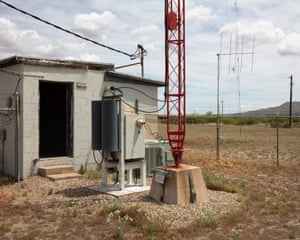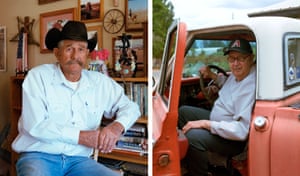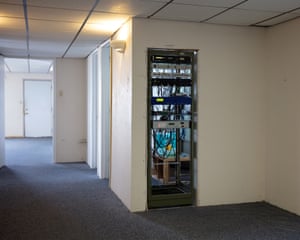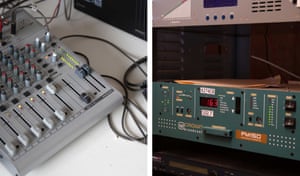Historical
See other Historical Articles
Title: America's rural radio stations are vanishing – and taking the country's soul with them
Source:
The Guardian
URL Source: https://www.theguardian.com/tv-and- ... -takes-americas-soul-with-them
Published: Jun 6, 2019
Author: Debbie Weingarten
Post Date: 2019-06-08 00:38:02 by Deckard
Ping List: *Music* Subscribe to *Music*
Keywords: None
Views: 1775
Comments: 4
When I arrive at the radio station, Mark Lucke is standing in the doorway, looking out at the spitting, winter rain. He’s slim and stoic, with sad, almost haunted, eyes. The first thing he asks is if I’d like to see “the dungeon”. Who wouldn’t? Lucke pulls on a Steeler’s jacket and a baseball cap over brown hair that falls halfway down his back, and leads me across the five-acre yard. Out here, 90 miles east of Tucson, the desert is a long sweep of brush the color of beach sand. Lucke seems to slip through the rainy day like a ghost. The radio station, whose call letters are KHIL, has long been the daily soundtrack for this frontier town (population 3,500) that prides itself on its cowboy culture and quiet pace of life. But six decades after the founding of the station, the property is in foreclosure, with utility disconnect notices coming nearly every month. Small-town radio is fizzling nationwide, as stations struggle to attract advertisement dollars. And as station owners are forced to sell, media conglomerates snap up rural frequencies for rock-bottom prices, for the sole purpose of relocating them to urban areas. In a more affluent market, they can be flipped for a higher price. With limited frequencies available, larger broadcasters purchase as many as possible – especially those higher on the dial – in a race not dissimilar to a real estate grab. At a time when local newspapers are vanishing at an alarming rate, the loss of a radio station leaves a community with another cultural and informational deficit. Communities are diminished when they lose their local radio stations, says Dennis Deninger, a communications professor at Syracuse University’s Newhouse School. His first media job was working at an AM station in Hornell, New York, where obituaries were read on air along with board of education updates. “We connected with people,” he remembers. “We told them stories about a fender bender that happened down on Main Street, or a local parade coming up, or the success of a youngster at the local science fair.” The 1996 Telecommunications Act changed the radio landscape dramatically, allowing for deregulation, which led to the rapid consolidation of the industry. In the months after the act’s passage, Reed Hundt, then the FCC Chair, spoke before Congress about “fostering innovation and competition in radio” and “[promoting] diversity in programming and diversity in the viewpoints expressed on this powerful medium that so shapes our culture”. And yet the act did not deliver on these ideals. Instead, for the first time, large media companies were allowed to buy up multiple stations without restriction. By 2002, the radio industry was essentially an oligopoly – just 10 parent companies controlled two-thirds of the listeners and revenue. “Consolidation has, in a lot of ways, killed the radio business,” says Barry Cohen, a former rural radio host and managing member of AdLab Media Communications, LLC. “With consolidation comes scale, and then you end up with an 800lb gorilla that has hold of resources, licenses and the market. You can have one entity owning six of the top stations in a single area.” Those large operators “buy up the best stations and signals, sucking all the money out of the marketplace”, says Cohen. As advertisers flock to larger stations, small independent radio operators like KHIL end up with fewer listeners, fewer sponsors, and far less revenue to get by. Today, the industry centers on remote service agreements – a shift driven by economics that has profound consequences for radio listeners. It’s common now for a single automated center to feed content to a slew of stations across the country. Deninger sees this as particularly problematic for small communities. “If local radio stations are getting their content fed in from some distant studio in another state, you have less information about your home,” he says. “Having less information about where you live and the people you live with …” He trails off. “I can’t think that’s a good thing.” But it’s not just information on the chopping block – it’s also identity, something that music uniquely reflects to a listener. Willcox rancher Dennis Williams explains that his agricultural community “is struggling to hold on to its identity”, and he regards KHIL as a critical touchstone, especially for the ageing population. Currently, 21% of Willcox is over the age of 60. When old-timers call the KHIL station to request a song, Lucke will scour eBay for records. When the vinyl arrives, sometimes from overseas, he’ll hand-repair any scratches and spend hours adding them to his 11,000-song digital music library, which he’s built over 14 years with personal funds. One elderly woman, who lived in the assisted living facility behind the station, sang a particular song at the county fair when she was 14 and hadn’t heard the song since – until Lucke found it online and played it on KHIL for her. Lonesome Willcox from Maxey Fish on Vimeo. Dale Allen, who lives in the nearby community of Sunsites, Arizona, says the music on KHIL reminds him of growing up in Iowa and hanging out with his friends at a local hamburger joint. He doesn’t have a computer or the internet, but listens to KHIL from a radio in his bedroom. “I play it all night long,” he says. “I mean, I sleep, but I turn it on and listen to it, and then I go to sleep … It reminds me of the good old days.” On a few occasions, he’s wanted to find a specific song from his youth, and so he’s developed a relationship with Lucke by phone. Lucke always comes through. “I’ve never seen a man more knowledgable about music,” he says. Years ago in Dallas, Lucke went to a honky tonk bar called Billy Bob’s and had an experience that would transform the way he thought about curating music. “You can imagine me in a redneck bar,” he tells me. “I’m the first one to get killed. I do not fit, especially when I have on my Van Halen T-shirt.” He’s also not a drinker because of childhood trauma – his parents both struggled with addiction – so Lucke says he people-watched, studying their reactions to the music. “You have your typical George Strait po-dunky songs, and there are people out there, but it’s boring. No one’s alive. And then all of a sudden, they put on Michael Jackson. And that dance floor was packed, like sardines. And then they went back to po-dunk, and it died.” For Lucke, the lesson from Billy Bob’s was clear as day. “There are no genres,” he says, “These people may be mostly urban cowboys, but they want to hear Michael Jackson. The construction worker who listens to George Jones and Merle Haggard, I can have him listen to Van Halen if I trick him. If I package it.” He likens packaging it to painting. He boldly mixes formats and weaves genres; his library is 75% female artists, even though he knows the old-timers will complain about too many women on the radio. And he’s forever on a search for what he calls “nuggets” to add to his library – those songs with such emotional heft that the listener is entirely consumed by the story or the feeling and is transported to a different world. “Sometimes the songs talk to me, sometimes they don’t. If they talk to me, I’ll find a song and put it on my station. If they don’t talk to me, I keep looking.” “What does it sound like when they talk to you?” I ask. “What does it feel like?” He pauses. He points to the very center of his chest. “It makes this terrible pain in here go away.” The main station building is crisscrossed with wires, soundboards and computer monitors. Several household fans keep the equipment from burning up since the AC went out. The rest of the building is virtually empty, with the exception of two offices turned bedrooms where Lucke and his 21-year-old son, Tristan, sleep on cots. They’ve lived here together since 2008, when they began sleeping on the floor of the lobby to deter vandalism and watch over the equipment. When Lucke began working at the station in 2003, KHIL and its sister station KWCX (then the only FM station in Willcox) were owned by Lakeshore Media, a national conglomerate. Then, the station employed a staff of 10 people. But over the next several years, there were multiple failed attempts to relocate KWCX to Tucson, which spooked advertising companies into pulling their ads. And because advertisements were sold for the two stations as a package, the financial damage spilled over on to KHIL. In 2007, a North Carolina based company purchased the sister stations and attempted to relocate KWCX to Tucson again. Again, the deal fell through. By 2008, Lucke says he was “the only employee here doing the job of three or four people, alone”. In 2017, KHIL was sold again, this time to a local resident who gave Lucke minority ownership of the business and promised him a $1,500-a-month stipend to manage the station. But in May 2018, Lucke says that the man ordered him to divert ad revenue from KWCX (which was still owned by the North Carolina media company). Lucke says he refused and that he hasn’t been paid since; according to a Department of Economic Security form signed by the owner, the non-payment was attributed to a lack of funds. The new owner did not respond to requests for comment. Lucke says he can’t remember the last time he had a day off, and the homepage of his personal website now proclaims: “KHIL has not paid Mark Lucke since April 2018! HVAC has been broken since December 2017! And he has still kept it on air!” Mark and Tristan rely on Snap and Medicaid. He also hosts an online shop for his self-published horror novels and poetry collections, as well as KHIL coffee mugs and other merchandise. Both say that the only thing that makes them feel “normal” is going to the Pizza Hut a few blocks away and sitting in the sunny window. It is there at the Willcox Pizza Hut, over a bowl of pasta and marinara sauce (which will last Lucke two meals), when he tells me that the pain in his chest feels like it’s bursting out of him. Some of his earliest memories involve being taken to the honky tonk bar by his parents, and watching them get drunk. “I saw horrible things as a child,” he says. Ironically, many of those memories are set to the soundtrack of classic country music – Conway Twitty, Jim Reeves, Mel Tillis singing Send Me To Tucson – and can trigger his post-traumatic stress disorder. Lucke has a complicated relationship with Willcox, perceiving that much of the town thinks of him as a “hippie” or an “outsider”, or assumes he’s a drug dealer because of his long hair. Still, Lucke has continued playing music for Willcox. For rural radio stations to survive, Barry Cohen says “they must become embedded in the community to the point that they are considered a necessary utility. In turn, the community must support them with both listenership and ad dollars.” “Most people don’t know that KHIL is in trouble,” says Dennis Williams. “But if they did know, I think they would step up for Lucke. I really do.” And if the station were to have more support, Williams says he can imagine an expansion of programming – early morning weather reports or community bulletins, and more interaction with the community. But for now, he says, “Lucke’s whole focus is keeping that radio station alive. He asks nothing else from the world. And if it didn’t exist, it would be a big hole in the community.” This article was supported by the Economic Hardship Reporting Project



and the Puffin Foundation.
Post Comment Private Reply Ignore Thread
Top • Page Up • Full Thread • Page Down • Bottom/Latest
#1. To: Deckard (#0)
Gosh. NPR doesn't have this problem.
What we need is a way to listen to music without tuning in a radio station. Maybe with some kind of handheld device. Far-fetched, I know.
Because NPR isn't stupid enough to try to keep both an AM and an FM station running in a shrinking graying town of 3,500 in a barren desert, 90 miles away from a metro area (just far enough that they can't get any metro listeners from the Tucson area). It's a stupid story. And, yes, those stations should both close and their radio spectrum should be used where there is a big enough audience to support them. I don't feel sorry at all for the doofus still trying to run this failed enterprise.
Certainly not with their own money. Which was my point.
#2. To: Deckard (#0)
America's rural radio stations are vanishing – and taking the country's soul with them
#3. To: misterwhite (#1)
Gosh. NPR doesn't have this problem.
#4. To: Tooconservative (#3)
Because NPR isn't stupid enough to try to keep both an AM and an FM station running in a shrinking graying town
Top • Page Up • Full Thread • Page Down • Bottom/Latest
[Home] [Headlines] [Latest Articles] [Latest Comments] [Post] [Mail] [Sign-in] [Setup] [Help] [Register]
